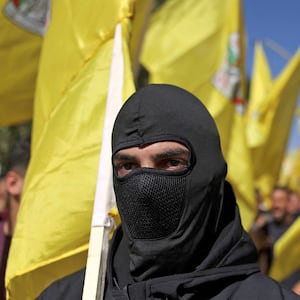Iran presents itself as the sponsor of the “liberation of Palestine,” and thus arms proxies and allies in four Arab countries—Lebanon, Syria, Iraq, and Yemen—as well as the Palestinian Territories.
In reality, Tehran is deploying what experts call its “proxy fleet-in-being,” an old tactic used by weaker navies against mightier ones. Iran deploys the proxy fleet to dominate what it imagines as the “Wider Persian Gulf,” an area that—in addition to its Gulf coast—includes the Arabian Sea, the Red Sea, and the Eastern Mediterranean. Tehran’s domination necessitates the ejection of America and the weakening, or even annihilation, of Israel.
Israel has been hitting back. In addition to its pledge to destroy the Iranian proxy Hamas in Gaza, and an ongoing war with another Iranian proxy, Hezbollah, across its border with Lebanon, Israel also managed to kill seven top Islamic Revolutionary Guards Corps (IRGC) officers in a strike on Syria.
ADVERTISEMENT
Iran’s Arab allies have voiced their expectation that Iran would respond directly by launching missiles from its territories against Israel. Bloomberg reported Wednesday that the Biden administration has warned Israel of an imminent Iranian attack.
But as of yet, Tehran has not done so, and its reluctance is attributed to its fear that any direct attack on Israel will give the Israelis a license to respond in kind—directly. When doing so, Israel might try to destroy Iran’s nuclear program facilities, the crown jewel of the Islamic Republic’s Wider Persian Gulf project.
Iran could opt for avenging its generals by impressing on its proxies to strike Israel. But most of these proxy militias—in Lebanon, Gaza, Syria, and Yemen—are already engaged in war with Israel. Lebanon’s Hezbollah is the only one with spare capacity to escalate the conflict with Israel, but if it does, it risks provoking a devastating full-scale war that neither side wants.
With limited revenge options, and perhaps to save face, Iranian officials leaked to the U.S. media reports about their smuggling of arms to the West Bank, presumably to “foment unrest with Israel.” None of this is new, except for anonymous Iranian officials taking responsibility—for the first time—for smuggling arms to Palestinians.
As far back as January 2002, Israel intercepted Karine A, a ship that was loaded with arms in Iran—including Katyusha rockets—which was sailing toward Gaza at the height of the Second Palestinian Intifada. Two months later, Hezbollah operatives were arrested in Jordan as they tried to smuggle Katyusha rockets to armed Palestinian factions in the West Bank.
Iranian attempts to smuggle arms and sow discord between Palestinians themselves—and also between Palestinians and Israelis—have never stopped since. In fact, they’ve been made easier by the collapse of central authority in Damascus and the transformation of Syria into a narcotics state, where Iranian proxies control large swaths of the country, especially in the south bordering Jordan.
With a war-torn country and crippling U.S. sanctions, Syria’s Assad regime now relies on its industrial-scale production of captagon, a cheap and highly addictive drug which Syrian dealers export to wealthy Gulf countries through Jordan. In the process, the captagon trade has transformed Jordan from a transit point into a major consumer market, thus alerting Jordanian authorities to the danger and prompting Amman to crack down on border smuggling, at times using fighter jets to hit smugglers. Iran uses captagon smuggling networks to send arms to Palestinians in the West Bank.
In December, with assistance from the Mossad, Israel’s intelligence agency, Jordanian police busted smugglers on the country’s northern border with Syria who were trying to sneak arms—including missiles, landmines, and sniper and M16 rifles—to Palestinians in the West Bank.
Over the past few years, Iran and Hezbollah have been agitating Palestinians to wage another intifada. Iranian efforts have led to a significant uptick in violent Palestinian attacks, especially in the West Bank, which is ruled by the Palestinian Authority that rivals Tehran-backed Hamas.
Islamist Iran has gone further by threatening to topple the Jordanian government and replace it with a “resistance” state.
“Because of its location, Jordan is very important for the [Iran-led] resistance axis,” said Ali Fadlallah, a spokesperson for Kataeb Hezbollah, an Iran-backed Iraqi militia. He added: “Unfortunately, because of the ruling regime, [Jordan’s] location benefits the usurping entity [Israel], and does not offer Palestinian resistance any support.”
Fadlallah promised to arm a militia of 12,000 Jordanians who, judging by the behavior of Iranian proxies elsewhere, will first use their muscles to take over the government, then start throwing rockets at Israel and U.S. forces.
In 1970, the late Jordanian monarch King Hussein ejected armed Palestinian factions from his country in a short round of war. Syria and Iraq could have intervened to tip the scales in favor of the Palestinian militias, and the United States’ posture of countering such intervention might have convinced Damascus and Baghdad to sit that war out.
With Iran successfully seeing its allies take over power in Lebanon, Yemen, and, partially, in Iraq and Syria, Jordan finds itself in a precarious position, facing Iranian threats of arming anti-government Jordanian militias and smuggling arms to the West Bank through Jordanian territory. Jordan thus needs American and Israeli support and help, like it received in 1970, to protect its sovereign government.
Iran is unlikely to relent. After all, the Wider Persian Gulf is an ongoing project. America and its allies must remain vigilant to counter Tehran’s troublemaking behavior, from smuggling arms to toppling states and forming loyalist militias in their place.








